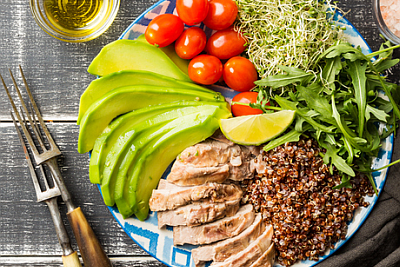We’re all about healthy food discovery—the search for the perfect recipe, the shopping, the cooking, and, of course, the eating! But enjoying a delicious meal is just the start of your food journey. The power of good nutrition happens inside your body. However, many of us don’t think about what happens to food once we eat it, until we may have an issue of some kind.
Understanding digestion is key to understanding how to optimize general health. It’s also important to avoiding or addressing many common digestive health issues. We chatted with Ethan Baldridge, MS, RDN, LDN, Nutrition Manager with Aramark, to demystify this process and learn how to improve our digestive health.
Tummy Troubles

Ethan Baldridge, Registered Dietitian Nutritionist
We’ve said it before: Your body is like an engine and it needs the right fuel to run efficiently. But like any complicated machinery, the digestive system doesn’t always run as it should.
We all experience digestive problems from time to time. In fact, digestive issues are a major reason why people seek medical advice, second only to the common cold. From occasional heartburn and constipation to more serious and long lasting problems, digestive concerns affect 60 to 70 million people annually in the U.S. (many people understandably avoid talking about this topic, but if you think you are having an ongoing issue, even if it seems minor, it’s really important to tell your doctor to make sure it’s not serious.)
Digestive problems can happen for many reasons. “In some people the problem is a food intolerance like many people have with dairy, or just eating something unusually spicy or rich,” Ethan says. “But what and how we eat can also throw our digestive health more seriously out of balance.”
A Peek Inside
So, what’s going on in there? It helps to cover a few of the basics. “Your digestive system’s job is to break down foods and liquids so you can absorb all the vitamins, minerals, and other nutrients,” Ethan explains. “Your body uses these nutrients for energy, to build and repair cells, and much more.”
The digestive process begins as soon as you start chewing. As your food travels down to your stomach the digestion process really gets going. But it doesn’t stop there. Throughout its journey through your small intestine, food is broken down even further. The nutrients are absorbed and sent to where they’re needed.
Whatever remains moves along … and eventually leaves your body. Depending on the person and what you’ve eaten, this process can take anywhere from two to five days.
8 Ways to Improve Your Digestive Health
There are things you can do to keep your insides happy. Ethan offers up these tips for people looking to improve their digestive health. The bonus—all of Ethan’s suggestions are also part of a well-rounded, healthy lifestyle. Better digestive health is just one of the many benefits.
- Focus on fiber
 There are two types of fiber, Ethan tells us. Soluble fiber, which absorbs water, has been shown to reduce bad cholesterol. Insoluble fiber does not absorb water and helps keep you regular. “A good food source of one kind of fiber usually has the other as well, just in different ratios,” he says.
There are two types of fiber, Ethan tells us. Soluble fiber, which absorbs water, has been shown to reduce bad cholesterol. Insoluble fiber does not absorb water and helps keep you regular. “A good food source of one kind of fiber usually has the other as well, just in different ratios,” he says.
Fiber also feeds the healthy gut bacteria that help with digestion, while keeping you feeling full between meals. Experts recommend getting 25 to 40 grams of fiber a day, though this varies from person to person. Enjoy fiber-filled foods like fruits, vegetables, whole grains, legumes, and pulses. The Mediterranean diet is good inspiration here!
Foods with Omega-3 fats, the kind that have so many other health benefits, will also help improve the diversity of your “gut biome”—in other words, all the beneficial microbes that live in your stomach and intestines. “Having a diverse gut biome is associated with better health, while less diversity is linked to chronic diseases,” says Ethan.
Good places to find foods with Omega 3s include fish, walnuts, and seeds such as hemp, chia, and flax. “Plant sources of healthy fats are generally also good sources of fiber,” Ethan notes. Now that’s a win-win!
- Eat fewer processed foods
Having too much of your everyday diet made up of ultra-processed foods may negatively affect your digestive health. This includes foods that are primarily made from refined sugar or refined carbohydrates. These foods often have little fiber and not much in the way of nutrients. So, in addition to being empty calories, if you regularly eat too much of them, they can also have other negative effects on your ‘digestive engine’.
“Consuming too much of the ingredients in ultra-processed foods can tend to promote the growth of not-so-good gut bacteria while suppressing the good bacteria that can be so beneficial. That’s the opposite of what you want,” says Ethan.
Also, eating too much red meat or processed meats has been shown to have the potential to cause digestive challenges, Ethan reminds us.
You don’t have to give up these foods entirely, just cut back when you can and enjoy them as occasional treats, not as a mainstay of your daily diet.
 Aim for 11 to 15 cups of water each day to keep things moving through your digestive tract. When you are dehydrated, water is drawn from your intestines to serve the rest of your body, which can lead to an uncomfortable ‘slow down’ in the digestive process (the “C” word). “This is why you want to increase your daily H20 intake along with your fiber intake,” Ethan elaborates.
Aim for 11 to 15 cups of water each day to keep things moving through your digestive tract. When you are dehydrated, water is drawn from your intestines to serve the rest of your body, which can lead to an uncomfortable ‘slow down’ in the digestive process (the “C” word). “This is why you want to increase your daily H20 intake along with your fiber intake,” Ethan elaborates.
- Chill out
If you cut back on your daily stress, it can have a big impact on how you feel inside and out. “Many of the acute gastrointestinal symptoms Americans struggle with result from stress,” says Ethan.
What’s the connection? Stress reduces the blood flow to your intestines. Normal, everyday, minor stress isn’t a problem for most. But too much stress that doesn’t go away can interrupt the digestive process. Not only will you absorb fewer nutrients, but you can experience either constipation or its opposite—when food moves too quickly through your system.
- Get moving
Yet another reason to exercise! Physical activity increases blood flow to all your muscles, including those in your digestive system. This helps the food you eat move along on its journey. And exercise improves sleep and lowers your stress levels, among many other health benefits, so bumping-up your activity level is something to add to your list.
- Pull up a chair
Know how your mouth waters at the smell of really good food? Your stomach does the same thing. “Our gut starts releasing digestive enzymes before you even take that first bite. Sitting down and enjoying your meal can help your body relax and begin this digestion process,” Ethan states. We know that we all must eat on the run from time to time but eating on the go all the time can contribute to digestive issues. So slow down, take a seat, a few deep breaths, and practice mindful eating.
- Take your time
 Try chewing your food thoroughly before swallowing. “When you chew your food well, it mixes with your saliva, which is full of enzymes that kick off the digestive process,” says Ethan. This habit also gives your stomach more time to tell your brain that it’s full, so you may be less likely to overeat. It’s another way to become a more mindful eater with all the many benefits this can deliver—for your health, and for helping you to appreciate and really enjoy your food.
Try chewing your food thoroughly before swallowing. “When you chew your food well, it mixes with your saliva, which is full of enzymes that kick off the digestive process,” says Ethan. This habit also gives your stomach more time to tell your brain that it’s full, so you may be less likely to overeat. It’s another way to become a more mindful eater with all the many benefits this can deliver—for your health, and for helping you to appreciate and really enjoy your food.
Go With Your Gut
Give these suggestions a try to improve your everyday digestive health. But remember, if you do have any ongoing issues or concerns, it’s important to talk with your doctor to get advice and treatment that’s just for you.
We know that digestive health is an important topic—and a big one, too! So be on the lookout for more Feed Your Potential 365 blogs from our dietitians and other experts exploring the gut microbiome, foods that support digestive health, and more.
Note: Since everyone’s health history and nutritional needs are so different, please make sure that you talk with your doctor and a registered dietitian to get advice about the diet and exercise plan that‘s right for you.

